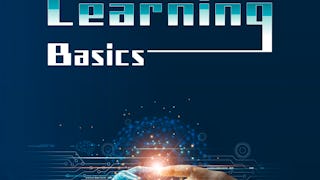Welcome to the "Machine Learning and NLP Basics" course, a comprehensive learning resource designed for enthusiasts keen on mastering the foundational aspects of machine learning (ML) and natural language processing (NLP). This course is structured to provide a deep dive into the core concepts, algorithms, and applications of ML and NLP, preparing you for advanced exploration and application in these fields.



Machine Learning and NLP Basics
This course is part of Learn Generative AI with LLMs Specialization

Instructor: Edureka
3,735 already enrolled
Included with 
(25 reviews)
Recommended experience
What you'll learn
Master ML and deep learning, and apply NLP for advanced text analysis and classification.
Skills you'll gain
- Predictive Modeling
- Natural Language Processing
- Supervised Learning
- Artificial Intelligence and Machine Learning (AI/ML)
- Artificial Intelligence
- Tensorflow
- Text Mining
- Artificial Neural Networks
- Machine Learning
- Deep Learning
- Applied Machine Learning
- Machine Learning Algorithms
- Unstructured Data
- Classification And Regression Tree (CART)
Details to know

Add to your LinkedIn profile
15 assignments
See how employees at top companies are mastering in-demand skills

Build your subject-matter expertise
- Learn new concepts from industry experts
- Gain a foundational understanding of a subject or tool
- Develop job-relevant skills with hands-on projects
- Earn a shareable career certificate

There are 4 modules in this course
This module of our course offers a comprehensive dive into the fundamentals, types, and applications of Machine Learning (ML), a pivotal aspect of artificial intelligence. It is meticulously crafted to transition learners from the basics of AI and predictive models in ML to a deeper understanding of different ML types—such as supervised, unsupervised, semi-supervised, and reinforcement learning. It further explores key concepts in classification and regression, including decision trees, random forests, and model optimization techniques. This module serves as both a foundational and an advanced exploration, catering to a broad spectrum of learners aiming to master machine learning.
What's included
28 videos4 readings4 assignments1 discussion prompt
This module provides a comprehensive exploration of deep neural networks, covering fundamental concepts, practical implementations, and advanced techniques. From understanding the basics of deep learning and its comparison with human brain functioning to delving into specific architectures like Convolutional Neural Networks (CNN) and Recurrent Neural Networks (RNN) with Long Short-Term Memory (LSTM), this module equips learners with the knowledge and skills needed to design, train, and optimize deep learning models for various tasks, including image classification and sequence prediction
What's included
70 videos9 readings6 assignments5 discussion prompts
This Module introduces the fundamentals of text mining and analysis. It covers various techniques for extracting, cleaning, and preprocessing text data, including tokenization, stemming, lemmatization, and named entity recognition. Additionally, the module explores methods for analyzing sentence structure, such as syntax trees and chunking, along with text classification techniques using bag-of-words, count vectorizers, and multinomial naive Bayes classifiers. Through practical assignments and discussions, learners gain insights into the applications of text mining across different domains and the essential tools and processes involved in working with textual data.
What's included
39 videos4 readings4 assignments3 discussion prompts
This module is the final stage of the course, offering learners a comprehensive review and evaluation of the knowledge and skills acquired throughout the modules. Throughout the module learners engage in various activities to solidify their learning and assess their understanding of the course material. These activities include completing a practice project that applies learned concepts to real-world scenarios, undertaking a graded assignment to evaluate proficiency, and potentially viewing a course completion video summarizing key takeaways and achievements.
What's included
1 video1 reading1 assignment
Earn a career certificate
Add this credential to your LinkedIn profile, resume, or CV. Share it on social media and in your performance review.
Explore more from Machine Learning

Sungkyunkwan University
 Status: Free Trial
Status: Free Trial
Why people choose Coursera for their career





Open new doors with Coursera Plus
Unlimited access to 10,000+ world-class courses, hands-on projects, and job-ready certificate programs - all included in your subscription
Advance your career with an online degree
Earn a degree from world-class universities - 100% online
Join over 3,400 global companies that choose Coursera for Business
Upskill your employees to excel in the digital economy
Frequently asked questions
Prior knowledge in programming, particularly Python, is helpful but not mandatory. The course is designed to accommodate beginners, with early modules introducing foundational concepts of machine learning and NLP.
Upon successful completion of all assignments and assessments, participants will receive a certificate, acknowledging their mastery of the course material and practical skills acquired.
Yes, the course is crafted for beginners, systematically building from basic to advanced concepts, ensuring a solid understanding of both machine learning and NLP.
More questions
Financial aid available,



